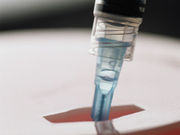Findings show improved comfort with self-injection, reduced anxiety for food-allergic adolescents
THURSDAY, March 16, 2017 (HealthDay News) — For food-allergic adolescents at risk for anaphylaxis, supervised self-infection with an empty syringe is associated with improved comfort levels with self-injection, according to a study published in the March-April issue of the Journal of Allergy and Clinical Immunology: In Practice.
Eyal Shemesh, M.D., from the Icahn School of Medicine at Mount Sinai, N.Y., and colleagues randomized 60 adolescent/parent pairs to self-injection, involving supervised self-injection with an empty syringe, versus control (education only) to examine the impact on comfort and anxiety during and after clinic visits in a food allergy center.
The researchers found that supervised self-injection correlated with a significant immediate increase in the primary outcome of comfort levels with the injection (within-group comparison: mean scores, 6.93 preintervention versus 8.37 postintervention; P < 0.01; between-group analysis of variance: 8.37 versus 6.69; P < 0.01). Improvements were also seen in all other secondary measures (adolescent and parent reports before versus after the injection, and changes in quality of life and anxiety a month later). Quality of life improved in 52 and 25 percent of intervention and control patients, respectively, on follow-up; similar differences were also seen for anxiety, although these differences were not statistically significant.
“A self-injection (with an empty syringe) procedure in a clinic setting improves adolescents’ and parents’ comfort level with self-injecting,” the authors write. “It may translate into substantial clinical benefits should self-injection be needed.”
Copyright © 2017 HealthDay. All rights reserved.








